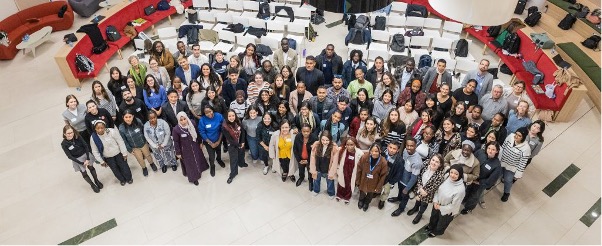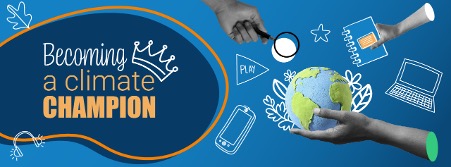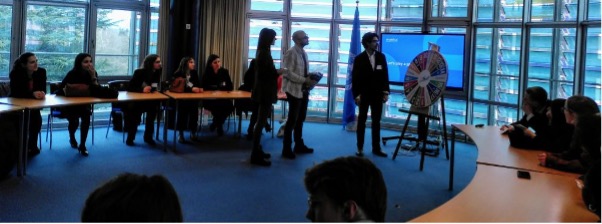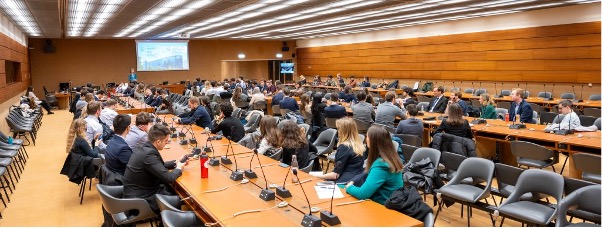Youth Climate Dialogues
The Youth Climate Dialogues (YCDs) initiative provides an opportunity for high school and university students and other young people in different countries to exchange information on climate change. In 2024, 19 new YCDs were held, bringing together more than 500 young participants.
Building on this initiative, UN CC:Learn, SDC, and the Kantonsschule am Burggraben in St. Gallen, Switzerland, are organizing an event to provide an opportunity for young people from the three linguistic regions of Switzerland to discuss with other young people and engage with thought leaders in a dialogue on climate change education. This event is scheduled for the second half of 2025.

Empowering Young Negotiators: Building Skills for Climate and Land Solutions
UN CC:Learn’s partnership with the Future Leaders Network led to the delivery of two unique and dedicated training programmes for young negotiators worldwide:
- The Climate Youth Negotiator Programme (CYNP), focusing on negotiations under the UNFCCC
- Pilot Land Youth Negotiator Programme (LYNP), which focused on negotiations under the UN Convention to Combat Desertification (UNCCD) in collaboration with the UNCCD Secretariat.
The Climate and Land training programmes offered a unique opportunity to explore the synergies between two of the three Rio Conventions and build the skills of young negotiators to navigate the complex and fast-evolving multilateral landscape.
The 2024 edition saw a total of 380 young negotiators participate across the CYNP and LYNP training, with 233 receiving UNITAR certificates and 190 attending COP29 and/or COP16.
96% of country representatives surveyed “agreed” or “strongly agreed” that young negotiators were well-prepared on the basic institutional knowledge of the UNFCCC process, and 92% “strongly agreed” or “agreed” that CYNP participants possessed the confidence and soft skills necessary for negotiating effectively.
“LYNP gave me confidence to represent Ecuador and get new connections from people from all over the world”. – LYNP 2024 Young negotiator from Ecuador.

Youth Engagement in Liberia and Ecuador
As part of the UN CC: Learn supported project in Liberia to develop the National Climate Change Learning Strategy, two young people from the Liberian Youth and Civil Society Environmental Secretariat were nominated by the Environmental Protection Agency (EPA) to ensure that youth are part of the process and that the Strategy captures the voices and input of the youth in Liberia.
Similarly, integrating youth’s voices has also been particularly important in the ENACE (National Strategy on Climate Education) development process in Ecuador, in collaboration with UNICEF, while activities targeting or involving young people have been supported.
New Training Products
In 2024, UN CC:Learn and UN Climate Change’s Youth4Capacity joined forces to develop the Becoming a Climate Champion e-course. This free, self-paced resource is designed to empower the next generation of climate leaders with the knowledge and skills to drive meaningful action.
The course, which takes around three and a half hours to complete is designed to introduce young people to five critical skills:
- Leadership,
- Project Management,
- Resource Mobilization,
- Leave No One Behind (inclusivity), and
- Communications.
These skills form the foundation for developing and implementing transformative climate projects that are effective, inclusive, and sustainable.

Mastering International Climate Negotiations
UN CC:Learn and UN Climate Change launched a new, free e-course on Mastering International Climate Negotiations: All You Need to Know in collaboration with the COP28 UAE Youth Climate Champion in the lead-up to the COP29 negotiations in November 2024.
This course, particularly designed for youth, offers a clear, accessible guide to the core areas of climate policy, making it ideal for youth delegates, members of youth-led organizations, and newcomers eager to learn more about and engage in international climate negotiations.
Through a blend of video-based lessons and interactive materials curated by UN Climate Change experts, the course breaks down important topics under negotiation in the UN Framework Convention on Climate Change (UNFCCC) process. It makes it easy for learners to understand the negotiation landscape, confidently follow discussions, and contribute meaningfully.
Career Inspiration and Insights
21 students from Kantonsschule am Burggraben St.Gallen visited UNITAR‘s headquarters in Geneva, Switzerland, for the fifth consecutive year and participated in a 2-hour session with UNITAR staff. The students’ visit was part of their International Relations class’s annual field trip to International Geneva and aimed at increasing the students’ interest in the Sustainable Development Goals (SDGs).

UN CC:Learn Inspire Students from College of Europe
UNITAR was invited to exchange with master’s students from the College of Europe during a two-day field visit to International Geneva. This provided an opportunity to discuss UN CC:Learn and the Partnership for Action on Green Economy (PAGE). The students were keen to understand better the development process of courses and how UN CC:Learn and PAGE engage with governments in training and capacity development.

Youth Alumni Survey
An impact survey focused on young alumni aged between 14 and 35 years old was conducted to understand how they have been applying what they learned through UN CC:Learn courses, what climate actions they have been taking, and how they have been contributing to climate discussions at local, national or global levels.
Key results show that:
- 89% of respondents have become more confident in speaking or advocating about climate change after taking a UN CC:Learn course.
- 89% of respondents changed the way they think and act to tackle climate change after completing a UN CC:Learn course.
- 97% of respondents changed their resource consumption pattern to some extent as a result of taking the course.
- 89% of respondents said UN CC:Learn courses gave them the necessary skills and knowledge to take climate action.
- 85% of respondents apply the knowledge and skills frequently or occasionally.
- 41% of respondents participated in climate change policy discussions at local, national, and global levels, and 66% of them attended community meetings (such as local town hall meetings, community forums, city council meetings, or school/university councils/associations) where climate-related issues were discussed and expressed their concerns.


 Go Back
Go Back